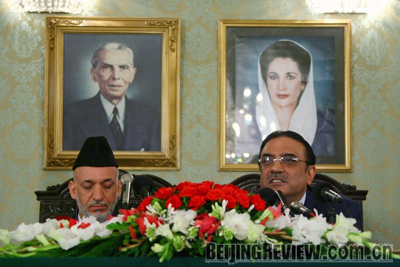|

WHAT'S AHEAD?: Pakistani President Asif Ali Zardari speaks at a press conference in
Islamabad on September 9 in front of a portrait of his late wife Benazir Bhutto.
Asif Ali Zardari was sworn in as Pakistan's new president at the presidential palace in Islamabad on September 9. One year ago, however, the same Zardari faced charges of murder and corruption. Will he be able to lead Pakistan out of its economic and security woes?
Pakistan's president is elected with a simple majority by an electoral college consisting of members of the two houses of parliament-the 342-seat National Assembly and the 100-member Senate-as well as members of the four provincial assemblies, which have 65 electoral college votes each. Zardari won the election with 481 votes, more than two thirds of the total. His election marked the Bhutto family's return to Pakistan's political forefront.
Zardari was born into a political family in south Pakistan's Sindh Province in July 1956. Upon graduating from Cadet College Petaro in 1972, he went to Britain for further studies. He became a construction magnate after graduation and married "iron butterfly" Benazir Bhutto in 1987. Basking in his wife's glory, he went through a series of ups and downs with her. After Bhutto was assassinated late last year, Zardari became co-chair of the Pakistan Peoples Party (PPP) with his son Bilawal Bhutto, putting him squarely in the center of Pakistan's political world.
With Zardari's election, the PPP secured control over the three most important posts in the Pakistani Government-president, prime minister and speaker of the National Assembly. The governing coalition led by the PPP has an overwhelming majority in the National Assembly. The PPP is also the ruling party in Sindh Province and the second largest party in the other provincial assemblies, where it takes part in governing coalitions. Many small and medium-sized parties in Pakistan have pledged support for the PPP. Chief Justice Abdul Hameed Dogar has long had close ties with the party. Since former President Pervez Musharraf resigned his military post in November 2007, Chief of Army Staff Ashfaq Kayani has tried to keep the military from interfering in politics. Zardari thus appears to have a secure hold on political power-for now.
Three challenges
As it comes to power, the PPP has to deal with complex realities facing the nation. Politically, the Pakistan Muslim League (Nawaz), or PML-N, could pose a major challenge to the PPP's rule. After winning the parliamentary election in February, the PPP and PML-N formed a coalition government with the Pashtun nationalist Awami National Party and the religious Jamiat Ulema-e-Islam (F). The coalition was based on an agreement to overthrow Musharraf's administration and amend the constitution to abolish the president's powers to dismiss the parliament and prime minister, but Musharraf's resignation on August 18 shook the coalition's foundation. The PPP and PML-N have also had bitter disputes over the restoration of the judges deposed by Musharraf during the state of emergency last year. Given these factors, the PML-N quit the government on August 25. Outwardly the party claimed it withdrew over disagreements with the PPP, but the move was in fact designed to keep the party away from Pakistan's many problems so that it can prepare for the next election.
| 